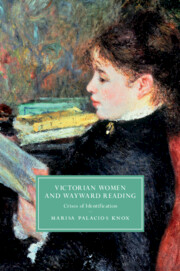Book contents
- Victorian Women and Wayward Reading
- Cambridge Studies in Nineteenth-Century Literature and Culture
- Victorian Women and Wayward Reading
- Copyright page
- Dedication
- Contents
- Figures
- Acknowledgments
- Introduction
- Chapter 1 Masculine Identification and Marital Dissolution
- Chapter 2 Novels without Heroines: Sensation and Elective Identification
- Chapter 3 Character Invasion and the Victorian Actress
- Chapter 4 Antipathetic Telepathy: Female Mediums and Reading the Enemy
- Chapter 5 “The Valley of the Shadow of Books”: The Morbidity of Female Detachment
- Chapter 6 The New Crisis: Can We Teach Identification?
- Notes
- Works Cited
- Index
- Cambridge Studies in Nineteenth-Century Literature and Culture
Chapter 3 - Character Invasion and the Victorian Actress
Published online by Cambridge University Press: 30 October 2020
- Victorian Women and Wayward Reading
- Cambridge Studies in Nineteenth-Century Literature and Culture
- Victorian Women and Wayward Reading
- Copyright page
- Dedication
- Contents
- Figures
- Acknowledgments
- Introduction
- Chapter 1 Masculine Identification and Marital Dissolution
- Chapter 2 Novels without Heroines: Sensation and Elective Identification
- Chapter 3 Character Invasion and the Victorian Actress
- Chapter 4 Antipathetic Telepathy: Female Mediums and Reading the Enemy
- Chapter 5 “The Valley of the Shadow of Books”: The Morbidity of Female Detachment
- Chapter 6 The New Crisis: Can We Teach Identification?
- Notes
- Works Cited
- Index
- Cambridge Studies in Nineteenth-Century Literature and Culture
Summary
This chapter continues the book’s analysis of sensation fiction to consider Wilkie Collins’s No Name (1862), with its actress antiheroine Magdalen, together with the memoirs of actresses as focal texts for examining wayward identification in a theatrical context. The figure of the actress dramatized the Victorian conception of female psychology as naturally fluid, apt to identify with and conform to the shapes of others’ personalities. While this supposedly made women better actresses, it also seemed to threaten the stability of the actress’s own “authentic” self. Charlotte Brontë’s immortalization of the actress Rachel as Vashti in Villette exemplifies this paradoxical perception of the era’s most prominent and powerful actresses as fragile vessels. While No Name spotlights the physical and psychic repercussions of Magdalen’s various dramatic roles, it never represents acting as the uncontrolled effluence of passion or even as self-forgetfulness. No Name casts its actress anti-heroine as a subject who is indestructible because of her imaginative mobility. She thus aligns with accounts of Victorian professional actresses who represent their identification with characters as a deliberate and habitual exercise instead of subjection through relinquishing agency.
Keywords
- Type
- Chapter
- Information
- Victorian Women and Wayward ReadingCrises of Identification, pp. 77 - 96Publisher: Cambridge University PressPrint publication year: 2020

